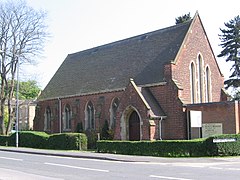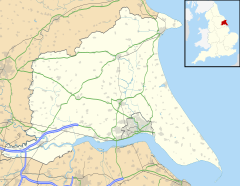Brough, East Riding of Yorkshire
| Brough | |
|---|---|
 All Saints' Church |
|
| Brough shown within the East Riding of Yorkshire | |
| Population | 7,000 |
| OS grid reference | SE942266 |
| • London | 155 mi (249 km) S |
| Civil parish | |
| Unitary authority | |
| Ceremonial county | |
| Region | |
| Country | England |
| Sovereign state | United Kingdom |
| Post town | BROUGH |
| Postcode district | HU15 |
| Dialling code | 01482 |
| Police | Humberside |
| Fire | Humberside |
| Ambulance | Yorkshire |
| EU Parliament | Yorkshire and the Humber |
| UK Parliament | |
Brough /ˈbrʌf/, is a small town in the civil parish of Elloughton-cum-Brough in the East Riding of Yorkshire, England. Brough is situated on the northern bank of the Humber Estuary, approximately 12 miles (19 km) west of Hull city centre. Brough has a long association with BAE Systems - founded by Robert Blackburn in 1916.
The town was known as Petuaria during the Roman period, and served as the capital of the Celtic tribe of the Parisi. Petuaria marked the southern end of the Roman road known now as Cade's Road which ran roughly northwards for a hundred miles to Pons Aelius (modern day Newcastle upon Tyne).
Brough was created a town by the Archbishop of York in 1239, granted the same liberties as Beverley. There is no record of these liberties having been employed, and the settlement operated as a village for further centuries.
The town is significant for its association with the highwayman Dick Turpin. About June 1737 Turpin boarded at the Ferry Inn at Brough, under the alias of John Palmer (or Parmen). Turpin travelled between and resided in Brough, until his capture and execution for horse theft in 1739.
The town has a population of approximately 7,000. Over the past couple of years there has been a shift in the socio-economic group of people living in Brough because of improved rail links and new housing developments. This change has brought more money into the area. As a result, the average wage rate and amount of spending has increased significantly.
...
Wikipedia

